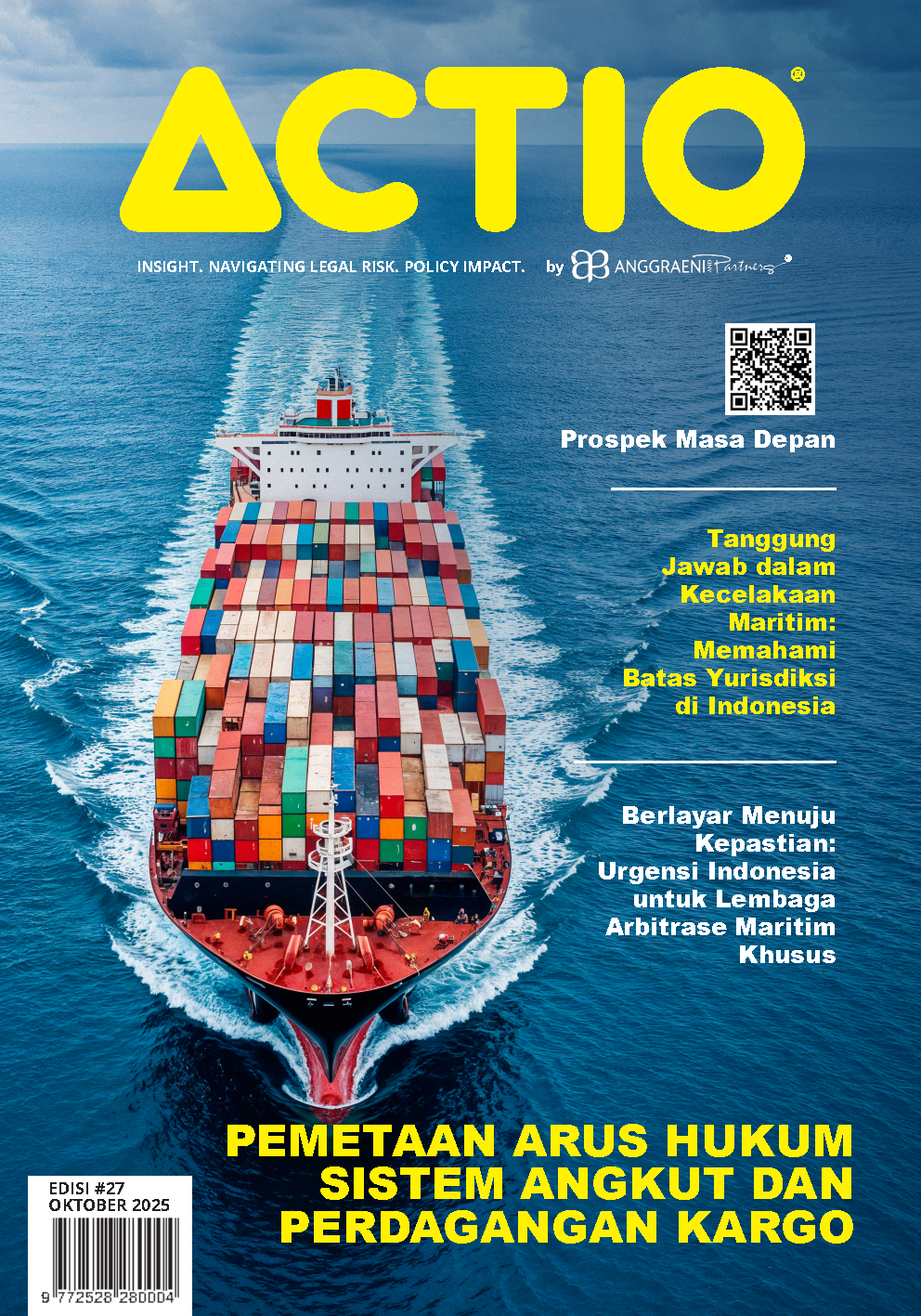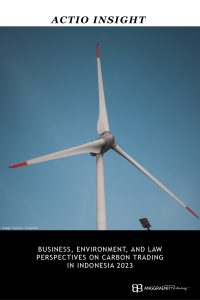Business, Environment, and Law Perspectives on Carbon Trading in Indonesia 2023
BUSINESS, ENVIRONMENT, AND LAW PERSPECTIVES ON CARBON TRADING IN INDONESIA 2023
By Setyawati Fitrianggraeni, Agnes Wulandari, Fajrin Muflihun,[1]
Introduction
Climate change has become the biggest global issue affecting the survival of our planet.[2] One of the causes of climate change is global warming.
Climate change caused by global warming is characterized by the melting of polar ice caps, destruction of ecosystems, and rising sea levels. In Indonesia, the National Research and Innovation Agency (BRIN) stated that there had been climatological changes from 2001 to 2019.[3] Researcher at the Pusris Climate and Atmosphere Erma Yulihastin said that in January 2023 the European Center for Medium-Range Weather Forecasts (ECMWF) declared that global warming is estimated at 1.21oC. In 30 years, this global warming may continue until it reaches 1.5oC in March 2023. He explained that climate change in Indonesia has different impacts and effects in every region in Indonesia.[4]
Another cause of global warming is the increase in the concentration of greenhouse gas emissions (GHG) produced by human activities.[5] GHG emissions cause a condition known as the greenhouse effect, which is a natural phenomenon that occurs due to the presence of certain gases in the atmosphere that capture and trap the sun’s heat. The greenhouse effect is needed to keep the earth’s temperature warm, but in excess, this condition can cause an increase in the earth’s temperature and lead to global warming.
The Intergovernmental Panel on Climate Change (IPCC) suggests that the livestock sector, the burning of fossil fuels in motorized vehicles, modern factories, power plants, and deforestation are the biggest contributors to the presence of GHG.[6] The Head of the Bandung Institute of Technology’s Energy Policy Center, Retno Gumilang revealed that there are 5 (five) sectors in Jakarta that are the biggest contributors to GHG emissions, namely transportation by 46% (forty-six percent), power generation by 31% (thirty-one percent), manufacturing industry 8% (eight percent), residential emissions or household waste 6% (six percent) and solid waste for final processing.[7]
In order to overcome global warming accelerated by GHG, efforts to reduce GHG emissions are crucial. Some of the steps taken include adopting renewable energy, increasing energy efficiency, changing agricultural patterns, and taking other steps to reduce human impact on the earth’s atmosphere and climate.
To solve this problem, many countries, including Indonesia, are trying to find an effective solution to reduce Greenhouse Gases (GHG).[8] One solution that can be implemented is carbon trading, which involves market mechanisms to reduce GHG emissions.
A Carbon market is seen as one solution to reduce GHG emissions in several countries. More than two-thirds of countries plan to use carbon markets to fulfill Nationally Determined Contributions (NDCS) as stipulated in the Paris Agreement. Countries such as Chile, Ghana, Jordan, Singapore, and Vanuatu have developed sophisticated and comprehensive infrastructures to engage in international carbon markets.[9]
Legal Basis of Carbon Trading in Indonesia
Nowadays, laws and regulations relating to implementing carbon trading in Indonesia are placed in the broader framework of climate change, environmental, and energy policy. Some of the relevant laws and regulations are as follows:
- Law Number 32 of 2009 regarding the Protection and Management of the Environment
This regulation becomes the legal basis for efforts to prevent, reduce, and control environmental pollution damage, including reducing GHG emissions.[10] This regulation is also a legal basis for protecting and managing the environment in Indonesia, including efforts to reduce GHG emissions. Article 65 paragraph (3) states that GHG emissions reduction can be carried out through market mechanisms, such as carbon trading. However, this regulation does not stipulate the implementation of carbon trading in detail.
- Law Number 16 of 2016 regarding Stipulation of Government in lieu of Law Number 1 of 2016 regarding Amendment to Law Number 23 of 2006 regarding Environmental Management.
This regulation stipulates a legal framework to reduce GHG emissions from deforestation and forest degradation, as well as stipulates community participation in these efforts.
- Law Number 30 of 2007 regarding Energy
This regulation covers renewable energy management and energy efficiency which can support efforts to reduce GHG emissions.[11] This regulation also stipulates energy management in a sustainable manner. Article 29 paragraph (3) states that the use of energy resources shall pay attention to environmental impacts and shall be environmentally sound. The use of a carbon trading mechanism can be one of the solutions to achieve this goal.[12]
- Government Regulation Number 61 of 2011 regarding the Implementation of Air Pollution Control
This regulation covers emissions control from various sectors, including industrial, agricultural, and transportation sectors. Even though carbon trading is not specifically mentioned, this regulation is still relevant in the context of efforts to reduce GHG emissions as part of air pollution control.
- Presidential Regulation Number 71 of 2011 regarding Control of Greenhouse Gas Emissions
This regulation is a form of implementation of the Paris Agreement on climate change ratified by Indonesia. This regulation stipulates a GHG emission control strategy covering industry, energy, and other sectors. However, this regulation does not specifically stipulate carbon trading issues.
- Circular Letter of the Minister of Environment and Forestry of the Republic of Indonesia regarding Restrictions on Direct Carbon Trading Contracts Number SE.3/MenLHK-PHPL/SET/SET.1/7/2017 dated 17 July 2017
- Minister of Environment and Forestry of the Republic of Indonesia Regulation Number 7 of 2023 regarding Procedures on Carbon Trading in the Forestry Sector
Mechanism of Carbon Trading in Indonesia
The Implementation of carbon trading in Indonesia requires appropriate mechanisms to be able to efficiently achieve its goals. One example is the Financial Services Authority Regulation Number 14 of 2023 concerning Carbon Trading Through Carbon Exchanges (“POJK 14/2023”). There are several steps that can be taken in implementing carbon trading, as follows:
- Emission stamp determination
The Government must set out GHG emission limits for certain sectors. This emission stamp will be a reference for companies, or other entities, to regulate and reduce emissions.
- Carbon quota allocation
The government then allocates carbon quotas to companies and entities whose emissions fall under an emission cap. These quotas can be sold to other companies that exceed their emission limits.
- Establishing A Carbon Exchange
Currently, the Government of Indonesia is preparing a market to facilitate carbon trading. The seriousness of the Government of Indonesia can be seen from the formation of POJK 14/2023 which has just been enacted. A Carbon exchange will be a marketplace where companies can meet, buy, and sell their carbon credits according to their needs. The Carbon Exchange as regulated in POJK 14/2023, will have the same concept as the Stock Exchange for trading shares.
Carbon exchange practices have been established in several countries including the European Energy Exchange (EEX) in Germany, CTX Global in England, Xpansiv and Intercontinental Exchange (ICE) in the United States, MexiCO2 in Mexico, Global Carbon Credit Exchange gCCEx in Hong Kong.[13]
- Monitoring and verification system
To ensure the success of carbon trading, a reliable monitoring and verification system is needed to measure GHG emissions accurately. This monitoring and verification system process is important so that carbon trading can be carried out in a transparent and trustworthy manner.
- Legal arrangements and oversight
Laws and regulations relating to carbon trading must be updated and improved to keep up with the latest needs and developments. Strict supervision is also needed to prevent any form of carbon trading mechanism abuse.
Benefits of Carbon Trading Implementation in Indonesia
Carbon trading implementation with proper regulation could provide various benefits for Indonesia, for example:
- Emission reduction
With economic incentives to reduce GHG emissions, economic sectors will be more motivated to switch to more environmentally friendly practices and contribute to overall emissions reduction.
- Additional income
Through carbon trading, Indonesia can generate additional income from the sale of carbon credits. This revenue can be allocated to support any other government environmental projects.
- Role in global efforts
By reducing GHG emissions, Indonesia will be actively involved in the global effort to mitigate climate change and keep our planet livable for future generations.
Conclusion
The implementation of carbon trading in Indonesia within a proper regulatory framework will be an important step in reducing GHG emissions and mitigating climate change. This effort requires cooperation and collaboration between governments, private sectors, and communities in achieving sustainable emissions reduction goals and positively impacting the environment and Indonesian society overall.
Even though Indonesia already has several regulations that are relevant to efforts to reduce GHG emissions, regulations around carbon trading should still be considered limited and not yet explicit. To encourage effective and sustainable carbon trading in Indonesia, we still need to create more specific and comprehensive laws and regulations concerning this matter.
The governments should encourage participation from multiple sectors, especially in the process of legislation drafting. Legislation should cover various economic sectors, including industry, agriculture, and energy. Legislation drafting that specifically stipulates carbon trading needs to be more detailed, including mechanisms, quotas, and the roles of parties.
Further, below is a list of recommendations that the Government of Indonesia can do to better facilitate carbon trading.e
- Offset Scheme Development: Indonesia can develop an offset scheme that can focus on forest restoration, peatland management, and other emission reduction projects that are in line with biodiversity and local wisdom.
- Laws and regulation analysis on carbon trading issues is pivotal to ensure the implementation of carbon trading mechanisms that are effective, durable, and in line with Indonesia’s goal to play an active role in mitigating climate change globally.
Footnotes
[1] Setyawati Fitrianggraeni holds the position of Managing Partner at Anggraeni and Partners in Indonesia. She also serves as an Assistant Professor at the Faculty of Law, University of Indonesia, and currently pursuing a PhD at the World Maritime University in Malmo, Sweden. Additionally, Agnes Wulandari is a Middle Associate in Advisory and Commercial Transactions. The writers express their gratitude to Dr. Hary Elias for generously dedicating his time to provide valuable feedback on their article.
[2] Haryo Limanseto, Siaran Pers HM.4.6/432/SET.M.EKON.3/11/2021 (Kementerian Koordinator Bidang Perekonomian Republik Indonesia, Jakarta, 28 November 2021) <https://ekon.go.id/publikasi/detail/3491/upaya-penurunan-gas-rumah-kaca-melalui-langkah-strategis-pada-sektor-kritikal-perubahan-iklim#:~:text=Perubahan%20iklim%20merupakan%20ancaman%20besar%20bagi%20kehidupan%20dan,memprioritaskan%20pembangunan%20rendah%20karbon%20yang%20inklusif%20dan%20berkeadilan.> accessed on 1 August 2023
[3]https://www.indonesia.go.id/kategori/editorial/7008/perubahan-iklim-indonesia-19-tahun-terakhir?lang=1 Accessed on 29 August 2023
[4]https://brin.go.id/news/112114/data-kamajaya-tujukkan-perubahan-iklim-2023-durasi-panjang-musim-hujan-di-indonesia Accessed on 29 August 2023
[5]https://www.kompasiana.com/dhilapfd/5a7c47535e13735e7c4d46d2/gas-rumah-kaca-dan-pemanasan-global#:~:text=Dengan%20temperatur%20rata-rata%20sebesar%2015%20C%20%2859%20F%29%2C,telah%20berlebihan%20di%20atmosfer%2C%20akan%20mengakibatkan%20pemanasan%20global. Accessed on 29 August 2023
[6]https://www.kompasiana.com/dhilapfd/5a7c47535e13735e7c4d46d2/gas-rumah-kaca-dan-pemanasan-global#:~:text=Dengan%20temperatur%20rata-rata%20sebesar%2015%20C%20%2859%20F%29%2C,telah%20berlebihan%20di%20atmosfer%2C%20akan%20mengakibatkan%20pemanasan%20global. Accessed on 29 August 2023
[7]https://megapolitan.kompas.com/read/2022/11/02/13525641/5-sektor-penghasil-gas-rumah-kaca-terbesar-di-dki-jakarta-berikut Accessed on 29 August 2023
[8] Haryo Limanseto, Siaran Pers HM.4.6/432/SET.M.EKON.3/11/2021 (Kementerian Koordinator Bidang Perekonomian Republik Indonesia, Jakarta, 28 November 2021) <https://ekon.go.id/publikasi/detail/3491/upaya-penurunan-gas-rumah-kaca-melalui-langkah-strategis-pada-sektor-kritikal-perubahan-iklim#:~:text=Perubahan%20iklim%20merupakan%20ancaman%20besar%20bagi%20kehidupan%20dan,memprioritaskan%20pembangunan%20rendah%20karbon%20yang%20inklusif%20dan%20berkeadilan.> accessed on 1 August 2023.
[9] https://www.weforum.org/agenda/2022/07/countries-on-the-cusp-of-carbon-markets/ Accessed on 29 August 2023
[10] Protection and Management of Environmental Law 2009
[11] Energy Law 2007
[12] Ibid.
[13] https://carbonmarketcap.org/a-guide-to-carbon-credit-exchanges Accessed on 29 August 2023
DISCLAIMER :
This disclaimer applies to the publication of articles by Anggraeni and Partners. By accessing or reading any articles published by Anggraeni and Partners, you acknowledge and agree to the terms of this disclaimer:
No Legal Advice: The articles published by Anggraeni and Partners are for informational purposes only and do not constitute legal advice. The information in the articles is not intended to create an attorney-client relationship between Anggraeni and Partners and the reader. The articles should not be relied upon as a substitute for seeking professional legal advice. For specific legal advice tailored to your individual circumstances, please consult a qualified attorney.
Accuracy and Completeness: Anggraeni and Partners strive to ensure the accuracy and completeness of the information presented in the articles. However, we do not warrant or guarantee the accuracy, currency, or completeness of the information. Laws and legal interpretations may vary, and the information in the articles may not be applicable to your jurisdiction or specific situation. Therefore, Anggraeni and Partners disclaim any liability for any errors or omissions in the papers.
No Endorsement: Any references or mentions of third-party organizations, products, services, or websites in the articles are for informational purposes only and do not constitute an endorsement or recommendation by Anggraeni and Partners. We do not assume responsibility for the accuracy, quality, or reliability of any third-party information or services mentioned in the articles.
No Liability: Anggraeni and Partners, its partners, attorneys, employees, or affiliates shall not be liable for any direct, indirect, incidental, consequential, or special damages arising out of or in connection with the use of the articles or reliance on any information contained therein. This includes but is not limited to, loss of data, loss of profits, or damages resulting from the use or inability to use the articles.
No Attorney-Client Relationship: Reading or accessing the articles does not establish an attorney-client relationship between Anggraeni and Partners and the reader. The information provided in the articles is general in nature and may not be applicable to your specific legal situation. Any communication with Anggraeni and Partners through the articles or any contact form on the website does not create an attorney-client relationship or establish confidentiality.
By accessing or reading the articles, you acknowledge that you have read, understood, and agreed to this disclaimer. If you do not agree with any part of this disclaimer, please refrain from accessing or reading the articles published by Anggraeni and Partners.
For further information, please contact:
P: 6221. 7278 7678, 72795001
H: +62 811 8800 427
S.F. Anggraeni
Managing Partner
fitri@ap-lawsolution.net
Agnes Wulandari
Middle Associate in Advisory and Commercial Transaction
agnes.wd@ap-lawsolution.net




